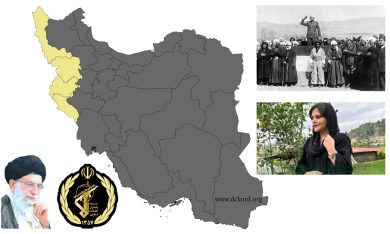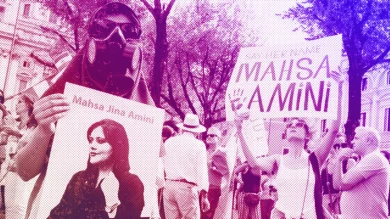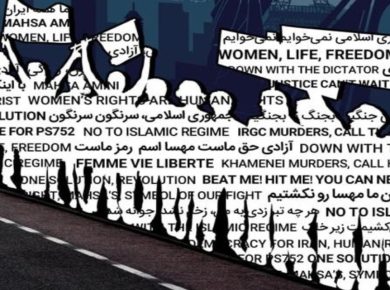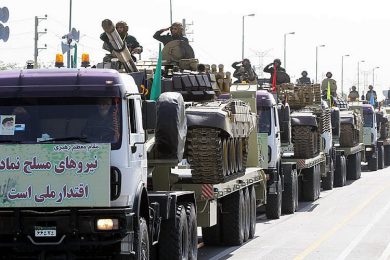In the Islamic Republic of Iran, gender oppression is not only enforced through ideological or legal means—it is also rooted deeply in economic structures controlled by the Islamic Revolutionary Guard Corps (IRGC). This powerful entity has entrenched itself in Iran’s political, military, and economic systems, wielding financial control as a weapon to silence dissent and suppress women.
This report explores how the IRGC’s economic empire enables gender-based oppression, restricts women’s access to opportunity, and reinforces a patriarchal system designed to stifle female empowerment. As women rise in protest, the IRGC uses its vast economic network to strike back—cutting off access to employment, education, and independence.
1. The IRGC’s Economic Empire: A Brief Overview
The IRGC, originally founded to protect the Islamic Republic, has grown into a sprawling military-industrial-financial complex. It controls:
• Major construction firms (e.g., Khatam-al Anbiya)
• Energy and mining sectors
• Telecommunications and digital infrastructure
• Banks and financial institutions
• Trade routes, ports, and smuggling networks
This economic dominance allows the IRGC to operate beyond legal oversight and divert resources toward political suppression, war efforts, and the enforcement of conservative gender norms.
2. Gender Oppression Through Economic Control
A. Limiting Access to Jobs and Opportunities
Women in Iran face significant legal and societal barriers to employment, but these are amplified by IRGC influence in key industries. The IRGC:
• Controls or influences hiring practices in public and semi-public sectors.
• Enforces ideological conformity through workplace dress codes and behavioral regulations.
• Prioritizes male employment, especially former or current IRGC personnel.
• Pressures private companies to uphold state-enforced gender norms or risk sanctions.
The result: educated and qualified Iranian women are often pushed out of the workforce, especially in male-dominated sectors like energy, construction, and finance.
B. Targeting Women Entrepreneurs and Business Owners
Women who seek economic independence through entrepreneurship face additional obstacles:
• Licensing and business permits can be blocked by IRGC-affiliated authorities.
• Women-led NGOs and startups are often denied funding or are surveilled.
• Female business owners are harassed, and their activities restricted under the guise of “national security.”
This suppression keeps many women economically dependent on male relatives or the state—undermining their autonomy.
3. The IRGC and the Sanctions Economy: Women Bear the Burden
A. How Sanctions Empower the IRGC
Ironically, international sanctions that target Iran’s economy have sometimes strengthened the IRGC’s grip. As legitimate companies falter, IRGC-owned firms and smuggling networks thrive—making them essential middlemen.
This informal economy, largely controlled by the IRGC, leaves little room for women, who are:
• Excluded from underground trade networks.
• Vulnerable to exploitation and trafficking.
• Often denied access to basic goods and medicine, especially in marginalized regions.
B. Austerity Measures and Gendered Economic Violence
As the IRGC directs resources to foreign proxy wars and internal security, public services and subsidies are slashed. The effects on women include:
• Cuts to education and healthcare budgets, limiting women’s access to essential services.
• Rising poverty rates, especially among single mothers and widows.
• Reduced support for domestic violence shelters, women’s centers, and legal aid organizations.
This economic violence is silent but devastating—undermining women’s ability to survive, let alone resist.
4. Economic Pressure as a Tool for Social Control
The IRGC uses financial leverage not just to impoverish women—but to coerce behavior and reinforce submission.
A. Enforcing Compulsory Hijab Through Financial Threats
Women caught violating hijab laws face:
• Fines that disproportionately affect poor and working-class women.
• Job loss or blacklisting from government and IRGC-affiliated employers.
• Denial of state services, including banking access and travel documentation.
B. Surveillance and Punishment
The IRGC’s intelligence branches collaborate with economic bodies to:
• Monitor bank accounts and online transactions.
• Punish “immoral” behavior by freezing assets or revoking business licenses.
• Target women activists with financial penalties or restrictions.
This economic surveillance state silences dissent before it reaches the streets.
5. Case Studies: Women Caught in the IRGC’s Financial Grip
A. Nasrin (pseudonym), a University Graduate
After being caught on video without a hijab during a protest, Nasrin was:
• Expelled from her university.
• Barred from government employment.
• Blacklisted by several private companies connected to the IRGC.
Despite having a degree, she now works informally, unable to find stable employment.
B. Shirin, a Tech Entrepreneur
Shirin founded a women-led app development company. Within a year:
• Her company was accused of “promoting western values.”
• Bank accounts were frozen by IRGC-linked financial regulators.
• She and her team were summoned for interrogation.
The company shut down, and Shirin is now seeking asylum abroad.
6. The Impact on Vulnerable Women
The IRGC’s financial tactics hit marginalized women the hardest:
• Ethnic minorities (Kurds, Baluchis, Ahwazis) face systemic poverty compounded by discrimination.
• LGBTQ+ individuals, particularly trans women, are denied legal work and often forced into unsafe situations.
• Former political prisoners—many of them women—face lifelong economic exclusion.
This systemic exclusion keeps women on the margins, making it harder to build coalitions or organize resistance.
7. International Responses and Opportunities
A. Sanctioning the IRGC’s Economic Arms
Several countries, including the U.S., have designated the IRGC as a terrorist organization and sanctioned its business networks. These efforts can be improved by:
• Targeting IRGC-affiliated banks, charities, and front companies.
• Supporting alternative, women-led economic initiatives inside and outside Iran.
• Amplifying civil society voices that document IRGC economic abuses.
B. Supporting Iranian Women’s Economic Autonomy
International NGOs, donors, and tech platforms can:
• Provide microgrants and training to women entrepreneurs.
• Fund secure digital tools that allow safe financial transactions and communications.
• Build solidarity networks for exiled women to stay economically connected and active.
Conclusion: Breaking the Chains of Economic Oppression
The IRGC’s financial empire is not just a means of profit—it is a system of control, where economic pressure is used to enforce gender oppression. But women in Iran are not passive victims. They continue to organize, protest, and build alternative futures.
Breaking the economic chains of oppression requires coordinated global action—sanctions that hit the IRGC’s pockets, support for Iranian women’s financial independence, and a refusal to normalize a regime that weaponizes money against half its population.
Join Our Newsletter!
Stay informed with the latest updates, news, and ways to take action in the fight for justice and global security. Sign up now to get updates delivered straight to your inbox!




